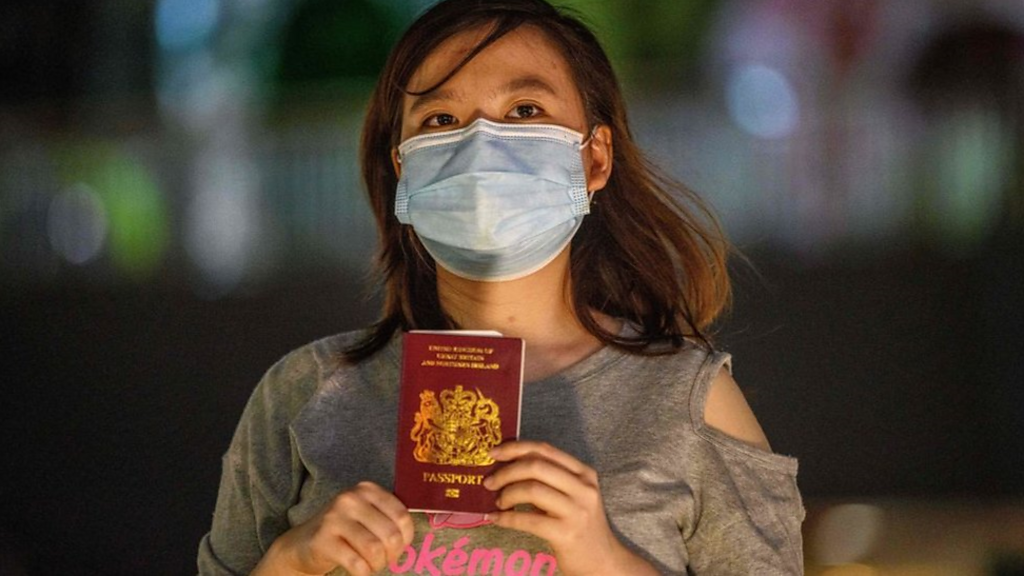Swapping Hong Kong for Crewe: 'We won't go back'
- Published
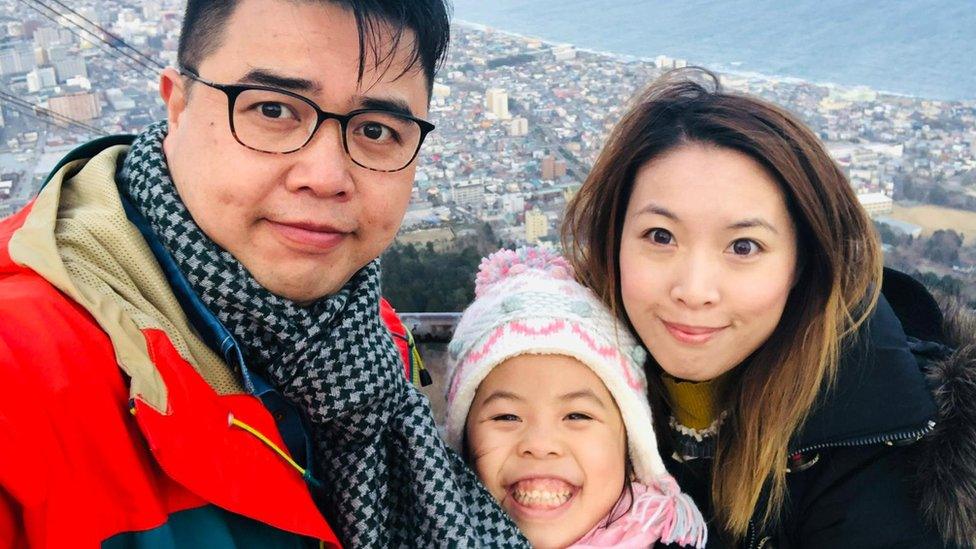
Eddie, Hayley and Yowin moved to the UK to escape tensions in Hong Kong
Thousands of people from Hong Kong have moved to the UK in the past year. Many have fled tensions with Chinese authorities there - others say they are attracted by a slower pace of life. The BBC has been speaking to some new arrivals about life in the UK.
Yowin Mo, Eddie Wong and their nine-year-old daughter Hayley swapped their high-rise flat in Hong Kong for a two-bed semi in Crewe, in the north-west of England. They didn't know anyone here and had never visited the UK before they moved, but so far they've had a good impression. "Most British people are polite and laid-back," says Yowin.
It wasn't an easy decision for the trio to leave their friends, family and jobs behind. "My dad cried, he didn't want to leave," remembers Hayley. She wasn't sure about the move either, but getting a puppy helped her settle in.
In Hong Kong, Yowin's marketing job was very demanding and she worked long hours. Eddie was a photojournalist. Now they've given up their hectic lives in a bustling world city to move to a small town with lower house prices and good schools.
"We don't expect to be rich," Yowin says. "We are just hoping to have a simple life here, and hopefully Hayley can grow up happy."
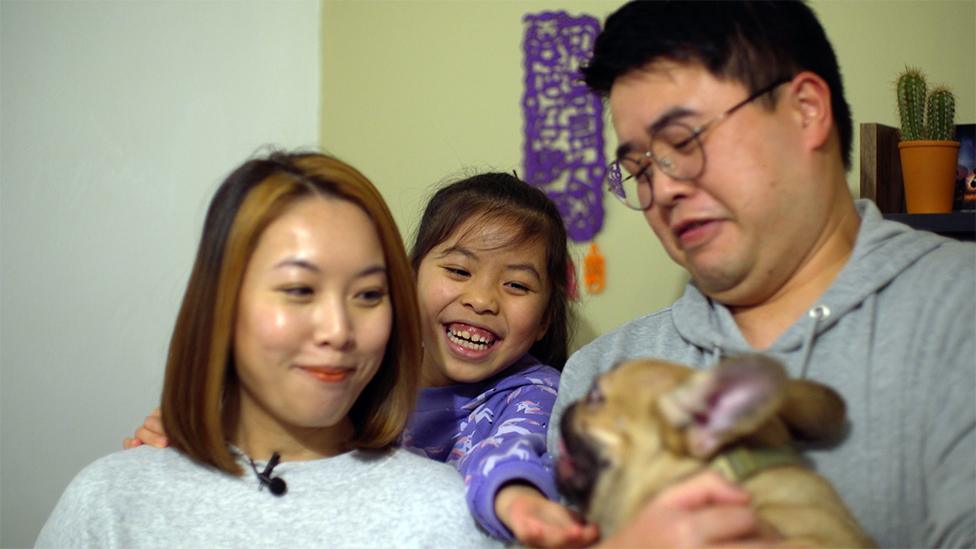
Yowin, Hayley and Eddie with their dog, Toffee
Yowin and Eddie felt leaving Hong Kong was in Hayley's best interests. She has happily settled into the local primary school, where 11 other Hong Kong children have since joined.
Yowin says going to school in Hong Kong was far more stressful - there was no playground to run around in and Hayley had homework to do until 19:00 every night.
But her main concern was that if her daughter had stayed in Hong Kong she would be "brainwashed". Yowin says Hong Kong's education system has changed drastically, external because children are now being taught the Chinese state-approved curriculum. She also fears the phasing-out of the speaking of Cantonese in schools, and that Hayley would be taught in Mandarin Chinese. "That's one of the reasons I don't want to stay in Hong Kong."
The Hong Kong government denies claims of brainwashing and says its education system has consistently developed generations of talents. It also says students are taught Cantonese, Chinese Mandarin, and English.
Another of Yowin's concerns is censorship. She believes Hayley wouldn't get the "true news" on TV. "Maybe only fake news, you know? In Hong Kong, she might not be able to say whatever she wants."
On a high shelf, out of Hayley's reach, Yowin keeps a book of photographs of the 2019 protests called Defiance, including several showing violent clashes between protesters and police. When Hayley is a bit older, Yowin hopes the photos will help explain why they felt they had to leave.
"When two million people are marching on the street and the government still ignores these voices, you will find the city is hopeless," says Yowin. "Every time I talk about it, I cry."
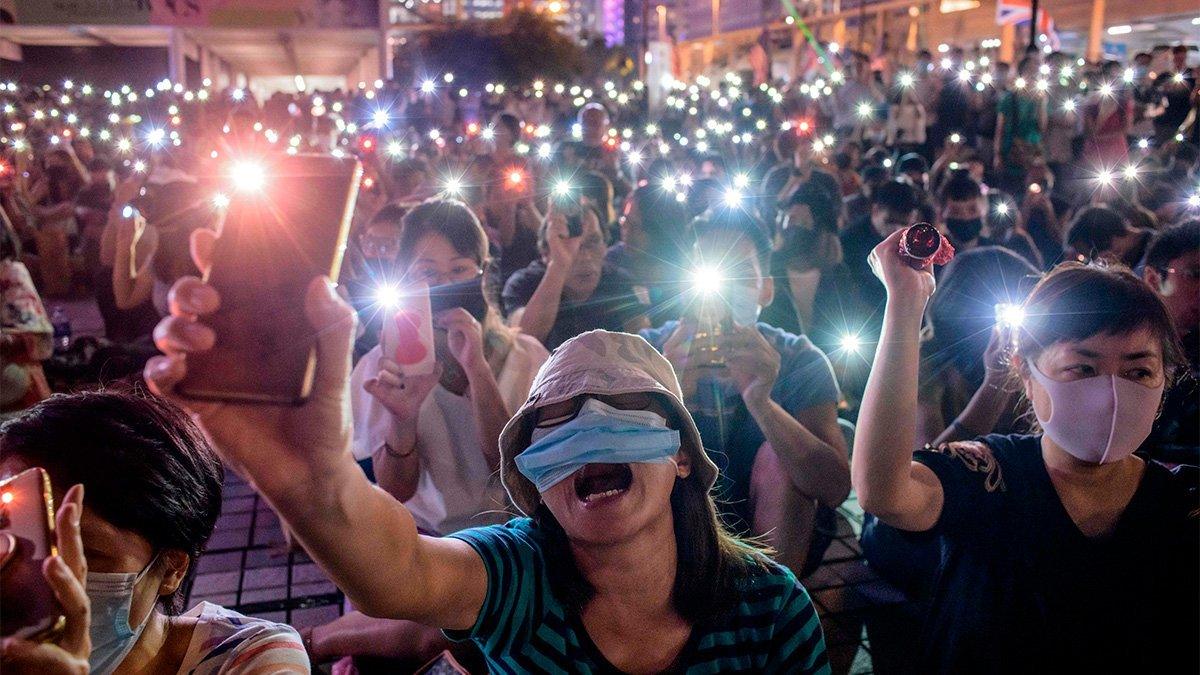
Pro-democracy protests in Hong Kong in 2019
They're far from alone in wanting to make the life-changing move. Government statistics suggest 140,000 Hongkongers have applied to live in the UK, external under a new visa route. It was brought in last year in response to China imposing a controversial new security law in Hong Kong, which the UK said was an erosion of freedoms and rights.
The route allows millions of people from Hong Kong - who applied for a type of nationality called the British National Overseas (BNO) citizenship, external before 1997, when the UK handed the former colony back to China - to apply to live, work and study in the UK. Family members can travel with them. After five years they can apply to stay permanently.
The North of England is a popular destination, with many families settling in places like Crewe, Stoke, and Warrington. And businesses are springing up to service this flurry of migrants.
One recruitment company has taken on two Cantonese speakers to tap into the new labour force. "We realised there was quite a big opportunity in terms of people coming over from Hong Kong," says Charlotte Shaw from KPI Recruiting in Stoke.
The agency hopes Hongkongers might offer a solution to the labour shortages, driven both by Covid and Brexit, says Charlotte. "We found that a lot of Eastern Europeans decided to leave the UK and have gone back home."
They've already had thousands of messages from Hongkongers looking for work.

Since last year, thousands of people from Hong Kong have left everything they knew behind to start new lives in the UK.

About 70% of those moving to the UK have a university degree or higher and more than half worked as professionals or senior managers in Hong Kong. So far, the recruiters have helped Hongkongers take up roles in call centres, food processing and office administration.
Eddie and Yowin know that they won't necessarily be able to earn the salaries they did back home, but they have a cushion of cash from the sale of their flat.
Yowin wants to work as a cashier or receptionist, whereas Eddie, who is taking English lessons, hopes to be a delivery driver. The recruiter offers them a 10-hour shift in a meat factory. "It's going to be like working like a robot," says Yowin.
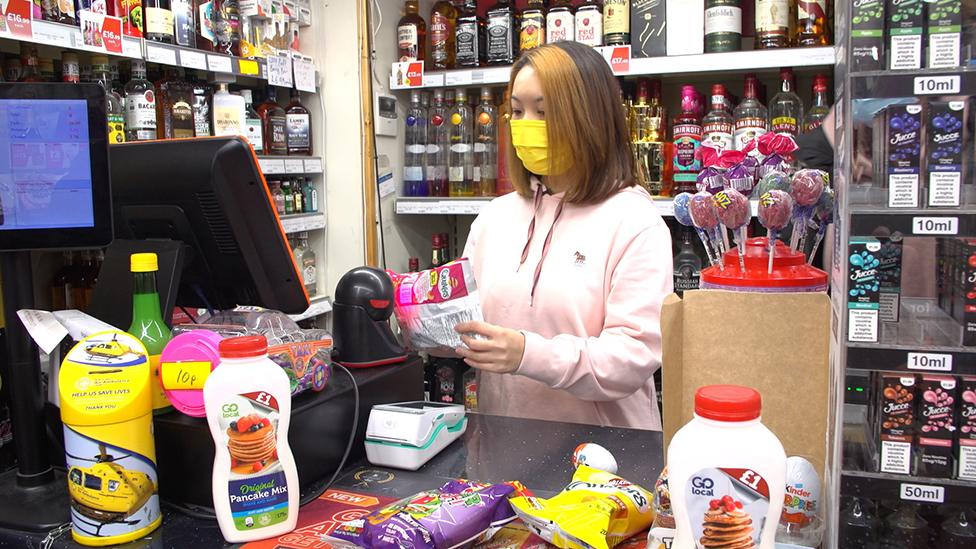
Yowin was offered a trial shift in a newsagent's
Meanwhile, in Warrington, Matthew Tse has set up a property company to help Hongkongers buy homes. He says his team of Cantonese speakers is getting 20 to 30 new clients a day, and that on average each client is bringing £700,000 to the UK. Bidding wars have broken out, he says, with properties sometimes going £30,000-£40,000 above the asking price.
One potential buyer, Charlie, is selling her apartment in Hong Kong for about £650,000 and has been on remote viewings of properties in Warrington, Cheshire, worth about £220,000.
"I've never been to Warrington before," she admits. "But I've got a few friends there. I believe most of the houses in England will be big enough for my kids to run around."
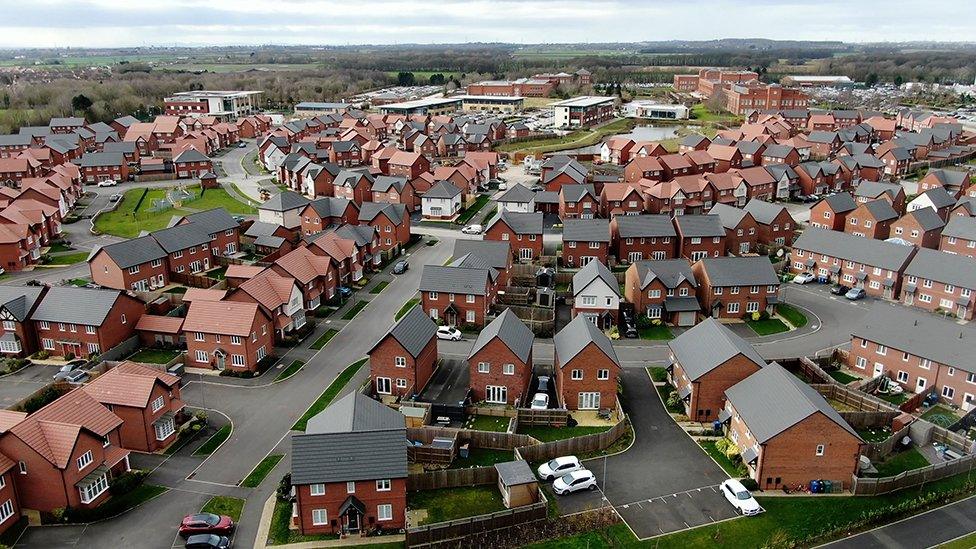
Hongkongers have been buying up homes in estates like this one in Warrington
The growing interest in moving to the UK has fuelled an explosion of Hong Kong YouTubers documenting their new lives in Britain. Videos rack up thousands of hits and range from reviews of new housing developments to a guide to eating a full English breakfast.
Hongkonger Heidi Simpson, who lives in Nottingham, has become a full-time YouTuber since moving to the UK last year with her fiance, Chris. "People in Hong Kong want to see videos of real life in the UK," Heidi says. "Like how to rent a house or how to use the self-service checkout."

One of Heidi Simpson's YouTube videos focused on Leeds University
Her videos are not political, but still they have become a target of those supportive of China's government. Heidi made a video about how difficult it was to make a GP appointment, but a pro-Beijing YouTube channel lifted parts of it as evidence that Hongkongers can't get medical treatment even if they have money. She feels her content has been used as propaganda to warn Hongkongers against moving to the UK.
"I was so shocked. I'm not happy with it. But I don't know what to do," says Heidi.
She will continue posting, but has concerns about her videos being monitored, and doesn't talk about her family back in Hong Kong.
The channel has not responded to the BBC's request for comment.
Many of those who took part in protests in Hong Kong have taken refuge in the UK.
Nathan Law is one of Hong Kong's most high-profile pro-democracy campaigners. He's now in political exile in Britain as he says he would face imprisonment if he returned home. But even here, he is still a target of Chinese propaganda and online attacks.
"You're facing the largest authoritarian regime in the world, their reach could be stretching in every corner of the society," he says. "And they can mobilise the necessary resources to hurt you in many ways."
Since arriving, one of the most serious threats Nathan has had was on a Chinese messaging service where users were offering a bounty of £10,000 for details of where he lives in the UK.
As a consequence, he is wary of being seen in public. "I rarely talk to my neighbours. I rarely go to the pub, because you never know whether this information will fall into the wrong hands."
But he refuses to let that stop him. "I need to be brave enough to continue my work. If I stopped working, as someone who campaigned for Hong Kong's democracy, then that's a victory for the Chinese Communist Party."
But the BBC has found evidence that, occasionally, tensions from Hong Kong have surfaced in the UK. Some Hongkongers have told us how they have received abuse online, and in person, from those who support the government's policies in Hong Kong.
Alan, not his real name, says he was attacked on a night out last autumn by a group of Chinese men after he shouted a pro-Hong Kong slogan at them.

Alan, not his real name, says he was attacked by a group of Chinese men
"Around 10 guys chased me and one of them pushed me onto the ground," he says. He was kicked in his head and ribs. He showed us a picture of his face, covered in blood. The police arrested two people in connection with the incident, but the case has now been dropped.
"I'm angry and scared because it is in the United Kingdom, not in China. How can I suffer this?" he says. "This is a country known for democracy and rule of law."
In Liverpool, Christie has started teaching martial arts self-defence classes after hearing about similar incidents of violence involving Hongkongers and those who support the Chinese Communist Party. She shows the class how to block someone if they are attacked. "We need to have some basic skills for Hongkongers to protect themselves when they encounter this kind of situation," she says.
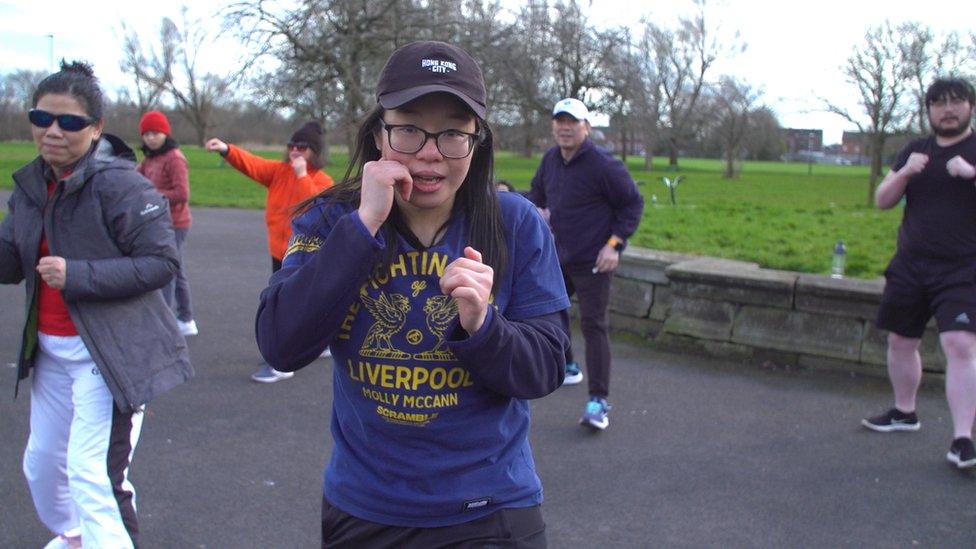
In a park in Liverpool, Christie teaches Hongkongers to defend themselves
But for others, life in the UK is peaceful.
Yowin has been offered a trial shift at her local newsagent in Crewe, stacking shelves and learning how to use the cash register. "As long as it can support my basic living, that's enough for me," she says.
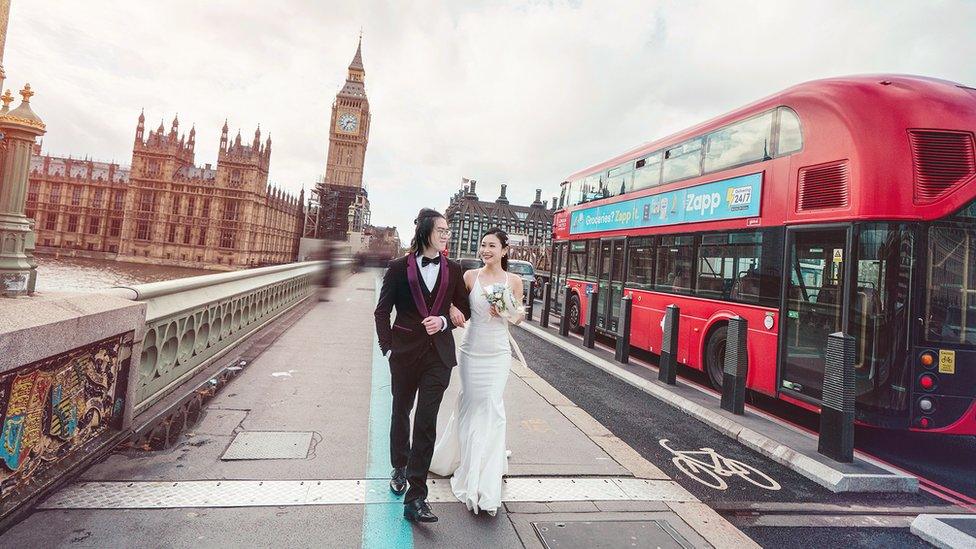
Chris and Heidi had their wedding photo shoot near Big Ben, in London
And Heidi and Chris are preparing for their wedding. For their photo shoot they chose the most British of backgrounds, the Houses of Parliament.
Heidi is sad that their families won't be able to attend, but she plans to stay in the UK. "We don't see a future in Hong Kong," she says.
- Published29 June 2022
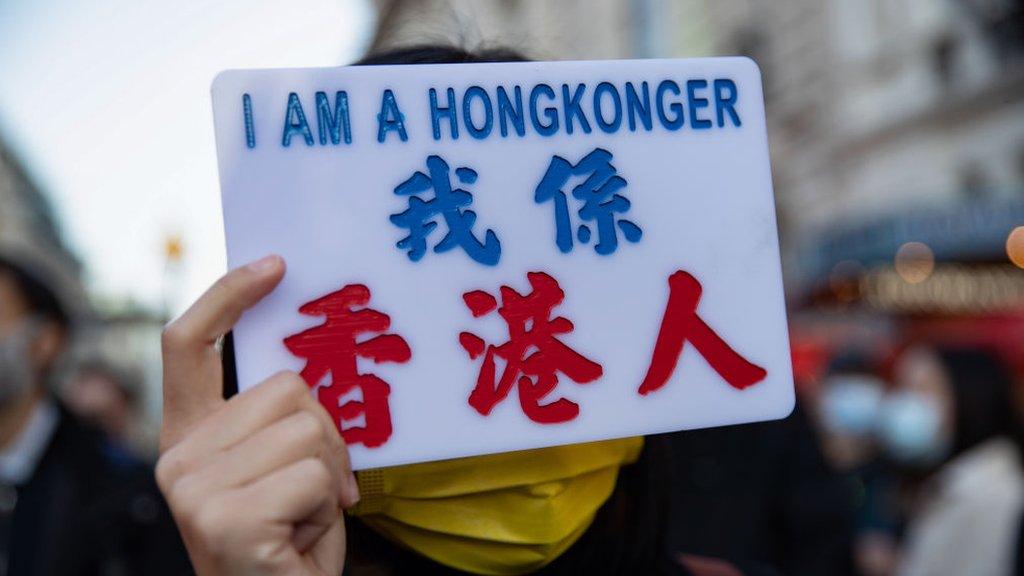
- Published1 July 2022

- Published1 July 2022

- Published29 January 2021
